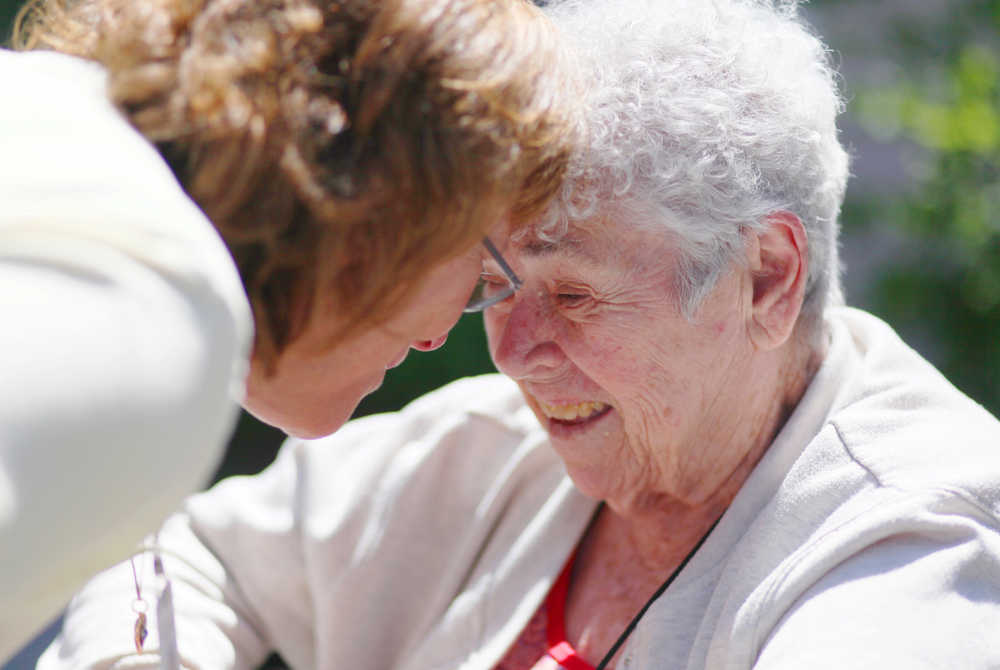Heritage Place, a continuing care and skilled nursing facility owned and operated by Central Peninsula Hospital, is now nationally certified as a top provider for elder care.
Staff received the news on June 15 that the facility is the first stand-alone, long-term care facility to receive a Planetree “Resident-Focused Community” designation in the United States, making it also one of only 70 facilities in the world that have received a Plantree designation. Planetree is a global non-profit that develops guidelines for resident-based care.
Heritage Place, a 60-bed facility, opened its doors in 1986.
“It’s always been the dream of the community that this would be a resident-centered philosophy of care,” said Social Service Associate Gwen Johnson.
Heritage Place operates as a “home-like setting” for residents, with a focus on providing excellent medical care, said Central Peninsula Hospital Marketing Manager Camille Sorensen. Those ideals aligned its methods of care with Planetree’s philosophy even before the process began, she said.
The application is rigorous, Sorensen said. Staff at Heritage Place had to complete onsite inspections, resident and family focus groups and coordinate with the hospital, she said. Sixty specific criteria must be met.
Factors weighed during the process of securing the designation, which began in 2006 for Heritage Place when the Central Peninsula Hospital first purchased the facility, include quality of the social environment, health care provided and freedom of choice that residents have. Happiness of staff is also addressed.
Louise Harbison has been a resident at Heritage Place for four years. She had previously lived at a long-term care facility in Cheney, Washington.
“The care I get (here) is perfect,” Harbison said. “It is entirely different.”
Harbison receives her medications on time, has various nutritional options and her family is allowed to visit or take her for overnight trips whenever she wants, all of which she wanted for at the previous facility.
Harbison said she is able to communicate her needs to staff, and appreciates the lack of anti-psychotic use. When someone is sedated they have no idea what is going on around them, which makes it impossible to communicate with staff, she said.
“These are physical and emotional restraints. Medications that cause sedation prevent the residents from communicating what their needs are,” said Administrator and Director of Nursing Sandi Crawford. “Often the risks of the medication far outweigh the benefit including death. By educating staff that every behavior is a means of communicating a need we are able to identify the need and satisfy it. It is a language we must learn, not subdue.”
Heritage Place is the only facility in Alaska that does not use anti-psychotic medication, restraints or alarms to address resident behavior, Crawford said.
The facility receives state and federal funding through the Centers for Medicare and Medicaid Services, as well as a small amount of private funding, Crawford said. Crawford uses resources for staffing the facility.
The ratios at Heritage Place are high, with roughly one staff member for every 5-7 patients, Crawford said. The Centers for Medicare and Medicaid which regulate long-term care standards nationwide, also rate Heritage Place as a five-star care center, which is only received by 10 percent of facilities in the United States, she said.
“We were well on our way on our journey when we started going for Planetree,” Crawford said.
The staff and resident nurses hired at the facility are usually in it for the long haul, Johnson said. A high staff-to-resident ratio coupled with primary care givers that have known their resident for a long time, yield positive results, she said.
Responses to patient calls are under two minutes and have been for years, and medical issues such as bedsores are virtually nonexistent at Heritage Place, Johnson said. Residents also get to make their own daily schedules; they wake up, eat and go to bed when they want to, Johnson said.
“This is their home,” Crawford said. “Often in long-term care the schedules are made to satisfy staff. When a resident enters an institution such as long-term care they lose all their choice, which leaves them feeling powerless. Imagine being told when to go to bed or eat or shower.”
Since Heritage Place was the first long-term care facility to receive the designation, staff at the facility helped develop the components and criteria that Plantree will base future long-term facility designations on, Crawford said.
“We just try to give good care, we try to keep it simple,” Johnson said.
Reach Kelly Sullivan at kelly.sullivan@peninsulaclarion.com.

